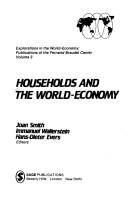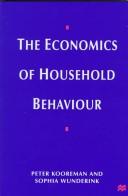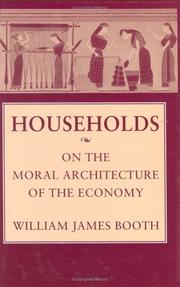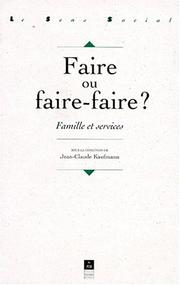| Listing 1 - 10 of 20 | << page >> |
Sort by
|

ISBN: 0803922906 9780803922907 Year: 1984 Volume: 3 Publisher: Beverly Hills, Calif.
Abstract | Keywords | Export | Availability | Bookmark
 Loading...
Loading...Choose an application
- Reference Manager
- EndNote
- RefWorks (Direct export to RefWorks)
International economic relations --- Housekeeping --- Households --- Capitalism. --- Economic aspects. --- Capitalism --- Economic aspects --- Households - Economic aspects
Book
ISBN: 1451863063 1462332668 1451908423 9786613820471 1452728968 1282392042 Year: 2006 Publisher: Washington, D.C. : International Monetary Fund,
Abstract | Keywords | Export | Availability | Bookmark
 Loading...
Loading...Choose an application
- Reference Manager
- EndNote
- RefWorks (Direct export to RefWorks)
This paper studies stylized business cycle properties of household production in four industrialized countries (Canada, the United States, Germany, and Japan). We employ a dynamic small open economy business cycle model that incorporates a household production sector. We use the model to generate data on home output, hours worked in the home sector, and hours spent on leisure. We find that in each country, home output is more volatile than market output while home sector hours are about as volatile as those in the market sector. In each country, leisure is the least volatile series. Leisure hours and home hours are countercyclical in all countries, and home output is not highly correlated with market output. Home sector variables are generally less persistent than market variables, and cross-country correlations related to home production tend to be lower than those related to market production. These findings demonstrate that despite some well-known structural differences in labor markets, the cyclical features of home sector variables are similar across the countries we consider.
Electronic books. -- local. --- Households -- Economic aspects -- Canada. --- Households -- Economic aspects -- Germany. --- Households -- Economic aspects -- Japan. --- Households -- Economic aspects -- United States. --- Households --- Economic aspects --- Population --- Families --- Home economics --- Exports and Imports --- Labor --- Macroeconomics --- Production and Operations Management --- Macroeconomics: Consumption --- Saving --- Wealth --- Prices, Business Fluctuations, and Cycles: General (includes Measurement and Data) --- Macroeconomics: Production --- Trade: General --- Demand and Supply of Labor: General --- Economic growth --- International economics --- Labour --- income economics --- Consumption --- Business cycles --- Productivity --- Exports --- Labor markets --- Economics --- Industrial productivity --- Labor market --- United States --- Income economics
Book
Year: 1997 Publisher: Oxford [England] New York Clarendon Press
Abstract | Keywords | Export | Availability | Bookmark
 Loading...
Loading...Choose an application
- Reference Manager
- EndNote
- RefWorks (Direct export to RefWorks)

ISBN: 0198287097 9780198287094 Year: 1991 Publisher: Oxford Clarendon
Abstract | Keywords | Export | Availability | Bookmark
 Loading...
Loading...Choose an application
- Reference Manager
- EndNote
- RefWorks (Direct export to RefWorks)
Microeconomics --- Households --- Family demography --- Economic aspects. --- Households - Economic aspects. --- Family demography - Economic aspects. --- ECONOMIE DE LA FAMILLE --- MENAGES --- ASPECTS ECONOMIQUES --- DEMOGRAPHIE --- FAMILLE
Book
ISSN: 20592507 ISBN: 9780511675270 0511675275 9780511672026 0511672020 9780511808210 0511808216 0521195829 0521124166 0511847726 9780511847721 1316086690 9781316086698 1282486667 9781282486669 9786612486661 661248666X 0511674082 9780511674082 0511670745 9780511670749 0511673299 9780511673290 9780521195829 9780521124164 Year: 2010 Volume: 46 Publisher: Cambridge New York Cambridge University Press
Abstract | Keywords | Export | Availability | Bookmark
 Loading...
Loading...Choose an application
- Reference Manager
- EndNote
- RefWorks (Direct export to RefWorks)
This investigation proposes a conceptual framework for measurement necessary for an analysis of household finance and economic development. The authors build on and, where appropriate, modify corporate financial accounts to create balance sheets, income statements, and statements of cash flows for households in developing countries, using an integrated household survey. The authors also illustrate how to apply the accounts to an analysis of household finance that includes productivity of household enterprises, capital structure, liquidity, financing, and portfolio management. The conceptualization of this analysis has important implications for measurement, questionnaire design, the modeling of household decisions, and the analysis of panel data.
Households --- Household surveys --- Surveys, Household --- Surveys --- Census --- Economic aspects --- Accounting --- E-books --- Economic aspects. --- Accounting. --- Business, Economy and Management --- Economics --- Households - Economic aspects --- Household surveys - Accounting

ISBN: 0333597362 9780333597361 Year: 1997 Publisher: New York, NY : MacMillan,
Abstract | Keywords | Export | Availability | Bookmark
 Loading...
Loading...Choose an application
- Reference Manager
- EndNote
- RefWorks (Direct export to RefWorks)
Home economics. --- Households --- Economic aspects. --- 330.56 --- Nationaal inkomen. Volksinkomen. Gezinsinkomen. Vermogensstratificatie. Particuliere inkomens en bestedingen. Armoede. Honger --- 330.56 Nationaal inkomen. Volksinkomen. Gezinsinkomen. Vermogensstratificatie. Particuliere inkomens en bestedingen. Armoede. Honger --- Households - Economic aspects.
Multi
ISBN: 9780521791595 9780521795395 9781139015882 0521791596 0521795397 1107720265 1107722551 1139015885 Year: 2014 Publisher: New York, N.Y. Cambridge University Press
Abstract | Keywords | Export | Availability | Bookmark
 Loading...
Loading...Choose an application
- Reference Manager
- EndNote
- RefWorks (Direct export to RefWorks)
The family is a complex decision unit in which partners with potentially different objectives make consumption, work and fertility decisions. Couples marry and divorce partly based on their ability to coordinate these activities, which in turn depends on how well they are matched. This book provides a comprehensive, modern and self-contained account of the research in the growing area of family economics. The first half of the book develops several alternative models of family decision making. Particular attention is paid to the collective model and its testable implications. The second half discusses household formation and dissolution and who marries whom. Matching models with and without frictions are analyzed and the important role of within-family transfers is explained. The implications for marriage, divorce and fertility are discussed. The book is intended for graduate students in economics and for researchers in other fields interested in the economic approach to the family.
Families --- Households --- Business and economics --- Microeconomics --- Economic aspects --- Quantitative methods in social research --- Sociology of the family. Sociology of sexuality --- Quantitative methods (economics) --- Families - Economic aspects --- Households - Economic aspects --- Economic aspects.
Book
ISBN: 0631192247 0631192239 Year: 1994 Volume: *3 Publisher: Cambridge, Mass. Blackwell
Abstract | Keywords | Export | Availability | Bookmark
 Loading...
Loading...Choose an application
- Reference Manager
- EndNote
- RefWorks (Direct export to RefWorks)
BMLIK
Sociology of the family. Sociology of sexuality --- Mexico --- Households --- Poor --- Women --- Working class --- Ménages (Statistique) --- Pauvres --- Femmes --- Travailleurs --- Employment --- Travail --- vrouwen --- armoede --- Ménages (Statistique) --- Economic aspects --- Guadalajara (Mexique) --- Households - Economic aspects - Mexico - Guadalajara. --- Working class - Mexico - Guadalajara. --- Women - Employment - Mexico - Guadalajara. --- Poor - Mexico - Guadalajara.

ISBN: 0801427916 Year: 1993 Publisher: Ithaca Cornell University Press
Abstract | Keywords | Export | Availability | Bookmark
 Loading...
Loading...Choose an application
- Reference Manager
- EndNote
- RefWorks (Direct export to RefWorks)
Economics [Marxian ] --- Economie [Marxistische ] --- Economie en marxisme --- Economie et marxisme --- Economie marxiste --- Marxian economics --- Marxisme en economie --- Marxisme et économie --- Marxistische economie --- Economics --- Households --- Marxian economics. --- Philosophy. --- Economic aspects. --- Moral and ethical aspects. --- Philosophy --- Economic aspects --- Moral and ethical aspects --- Households - Economic aspects. --- Households - Moral and ethical aspects.

ISBN: 2868471706 2753537801 9782868471703 Year: 1996 Publisher: Rennes II : Presses universitaires de Rennes,
Abstract | Keywords | Export | Availability | Bookmark
 Loading...
Loading...Choose an application
- Reference Manager
- EndNote
- RefWorks (Direct export to RefWorks)
Pourquoi faire appel aux services de « Pizza express » le jeudi et préparer des confitures maison le dimanche ? Quelles tâches sont effectuées au sein de la famille et quelles autres sont confiées à l'extérieur ? Quel est le rôle des réseaux de parenté ? Comment s'organisent les relations entre un ménage et les personnes qu'il emploie ? Le sens commun distingue activités familiales et non familiales, ce qui est dans la famille et au dehors. Or une même activité peut fonder l'intimité ici ou correspondre à une prestation professionnalisée ailleurs. L'analyse de ces mouvements fait apparaître une réalité inhabituelle de la famille, non plus définie de manière naturaliste ou essentialiste, mais se construisant comme telle par la domestication de ses activités. Les résultats présentés sont aussi d'une brûlante actualité sociale. À l'heure où la classe politique découvre des « gisements d'emploi » dans les activités familiales susceptibles d'être déléguées, il n'est pas sans intérêt en effet de souligner l'importance des logiques domestiques qui constituent autant de freins à cette délégation. Fruit d'un travail collectif de deux ans, qui a réuni les meilleurs spécialistes, Faire ou faire-faire ? est à la fois un bilan des acquis du savoir et une mise en commun de questions pour structurer ce champ de recherche novateur.
Families --- Home-based family services --- Intergenerational relations --- Work and family --- Familles --- Familles, Services à domicile aux --- Relations entre générations --- Travail et famille --- Family services. --- Child care services. --- Intergenerational relations. --- Work and family. --- Family --- Households --- Home economics. --- Economic aspects. --- Labor & Workers' Economics --- Business & Economics --- Family - Economic aspects. --- Households - Economic aspects. --- services à la personne --- auxiliaire de vie sociale --- relations entre générations --- famille --- services de proximité --- care
| Listing 1 - 10 of 20 | << page >> |
Sort by
|

 Search
Search Feedback
Feedback About UniCat
About UniCat  Help
Help News
News